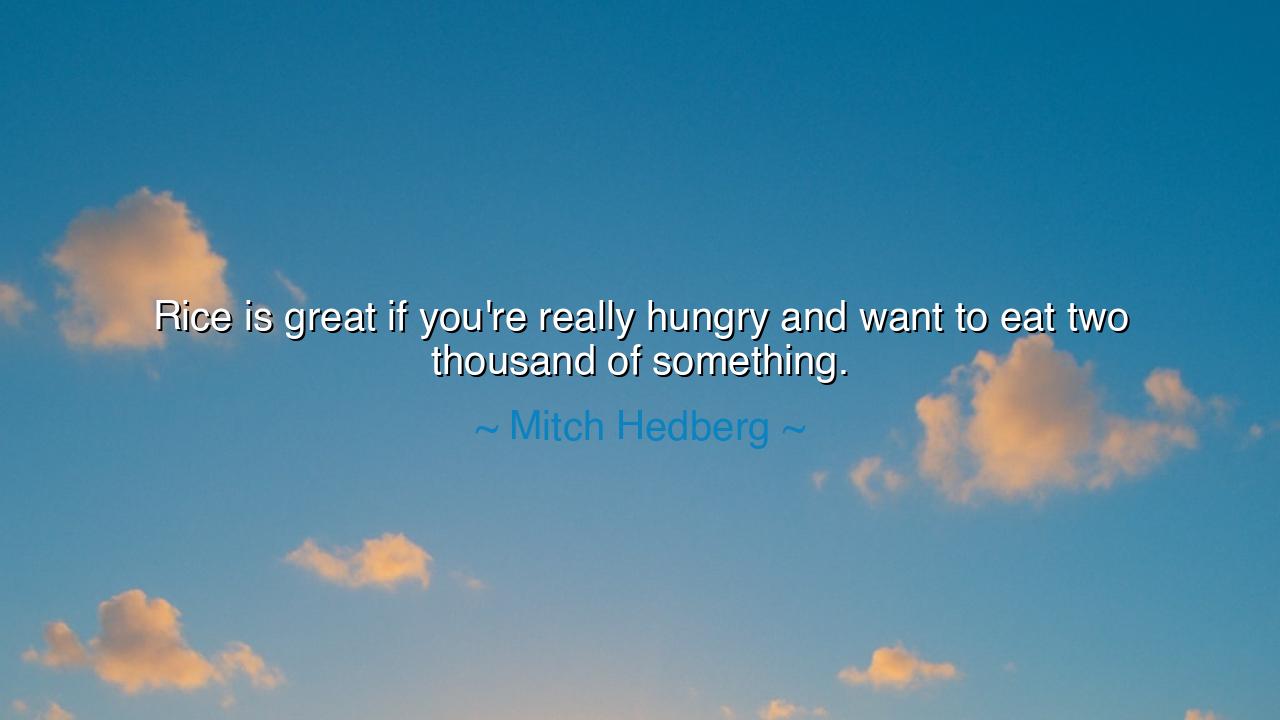
Rice is great if you're really hungry and want to eat two






Hearken, children of future generations, and attend to the curious wisdom of Mitch Hedberg, who once said: “Rice is great if you're really hungry and want to eat two thousand of something.” Though framed in jest, his words conceal a profound truth about the nature of abundance, simplicity, and the hidden humor in life’s ordinary things. The ancients often taught that the smallest, most unassuming elements of life can reveal the grandest lessons, if only we observe with care.
In this simple observation about rice, Hedberg invites us to contemplate the power of quantity and modesty united. A single grain may seem insignificant, yet in multitude, it sustains life and feeds the body. So too in human endeavor: small acts, repeated and multiplied, build empires, nourish communities, and shape destinies. Consider the parable of the mustard seed in the scrolls of old—a tiny seed, yet capable of growing into a mighty tree, sheltering birds and beasts alike. The joke about eating “two thousand” grains reflects this ancient truth: greatness can arise from the humble, and the ordinary can carry the extraordinary.
Hedberg’s wit also teaches us the importance of perspective and appreciation. To eat rice is to partake in a food that has sustained countless civilizations—China, India, Japan, and beyond—feeding kings and peasants alike. By focusing on the sheer multitude of grains, he subtly underscores the richness that lies in abundance, even when concealed within simplicity. In this, his humor mirrors the wisdom of ancient storytellers, who often found moral and philosophical insight in mundane objects: a stone, a loaf of bread, a single candle flame.
History is replete with examples where attention to the smallest units produced monumental effects. Consider the engineers of ancient Rome, who laid thousands of stones meticulously to construct aqueducts, bringing life-giving water to entire cities. To the untrained eye, one stone seemed trivial; yet the collective power of thousands created sustenance and civilization itself. Hedberg’s rice, eaten grain by grain, becomes a metaphor for human effort: the accumulation of small, persistent actions yields results beyond imagination.
Yet there is also a lesson in joy and perspective. Hedberg’s observation is humorous because it frames an ordinary experience in an unexpected way, reminding us to approach life with curiosity and levity. The ancients, from the Greek philosophers to the Zen masters, often employed humor and paradox to awaken insight. A simple joke about rice is, in essence, a meditation on sufficiency, abundance, and the delight hidden in the everyday.
Practical wisdom emerges from this reflection: cherish the small things, recognize the power of incremental effort, and find humor in life’s ordinary moments. Whether you are feeding the body, nurturing a skill, or building relationships, understand that greatness is often cumulative, composed of countless minor contributions that, when embraced with attention, yield extraordinary outcomes.
Children of the ages, let this lesson remain in your hearts: do not scorn the small, the ordinary, or the plentiful. Just as one grain of rice multiplies into nourishment, so too does repeated effort, laughter, and mindfulness create richness in life. Even the humblest object may reveal a universe of insight, if approached with awareness, gratitude, and a spark of joy.
Finally, allow the words of Mitch Hedberg to guide your spirit: seek abundance in simplicity, humor in the mundane, and wisdom in the countless small things that surround you. Eat your rice, count your grains, and remember that life’s grandeur often lies not in the single monumental, but in the thousands of modest wonders that sustain body, mind, and soul.






AAdministratorAdministrator
Welcome, honored guests. Please leave a comment, we will respond soon